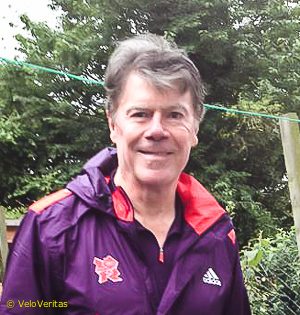
When I started cycling back in 1971 I quickly learned that there were five men I should stand in awe of; Belgians, Eddy Merckx – no explanation necessary – and Patrick Sercu, world sprint champion, Olympic kilometre champion and Grand Tour stage winner; Danish super stylist, world hour record holder Ole Ritter; British 25 mile record holder, Alf Engers and long term Scottish 25 mile record holder, John McMillan.
Over the years I’ve managed to get my picture taken with Eddy and Ole, interviewed Alf and have even had the odd chat with Patrick.
‘How are you today, Mr. Sercu?’
To which the great man replies; ‘Well, I’m still alive!’
John McMillan has eluded me – until today.
But he wasn’t just a ‘tester;’ he was an accomplished track rider, an international rider as an amateur and a UK professional in the days of Les West, Sid Barras and Colin Lewis.
Here’s what he had to say to us.
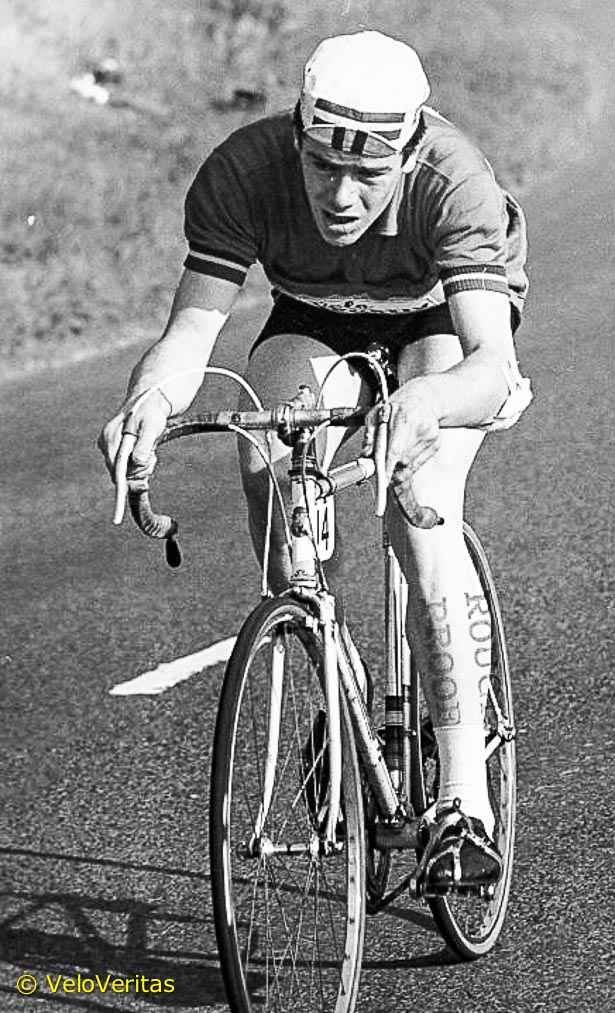
How and when did you get into cycling and who were your Scottish and European role models back then?
“I got into cycling at the end of the 50’s, simply because we moved house and I found a bike in the garden shed.
“I liked cycling, joined the CTC and went Youth Hostelling.
“A next-door neighbour, David Fairholme, got me interested in racing, and I rode my first 10 mile TT in 1960… and no, I’m not telling you the time…
“Scottish role models were Kenny Laidlaw, Ernie Scally (and there’s a tale!).
[John alludes to Ernie’s involvement in a lorry-load of whisky ‘going missing.’ ed.]
“European-wise, Jacques Anquetil (I interviewed him shortly before his death in 1987) and Rik Van Looy – I even used handlebar controls to look like him…”
It’s 40 years since you won the Tour of the Trossachs – do you remember much about that day?
“Not a great deal, I was feeling pretty good that morning, but was apprehensive about the Duke’s Pass.
“I flew up it, and can remember some of my club mates cheering me on halfway up.
“I had a “moment” on the descent, passing a Tour Bus, when some sheep decided to cross the road but felt really strong on the Braes of Greenock climb – and yes, Jocky Allan (the Velo Sportiv club’s fabulously eccentric manager, unfortunately no longer with us. ed.) was there shouting me on…”
“He even agreed that I had done; ‘Not a bad ride.'”
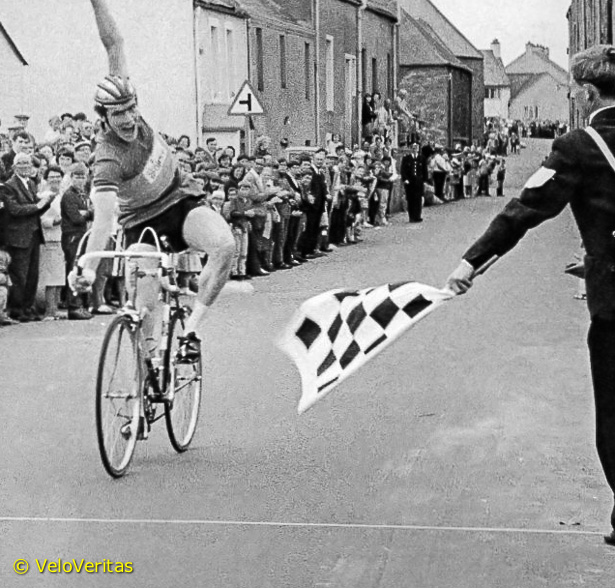
When I started cycling in 1971, your 55 minute 25 record was the Holy Grail – do you remember much about that ride?
“Strange, as it was a midweek “25” on a lumpy course – Freuchie, in Fife.
“I spent a lot of time on the small ring (44, back then), and I was convinced I was not going terribly well. It was one of those days when it hurt a lot, and I thought I was creeping, but it turned out that it hurt a lot because I was flying.
“I remember going back to Edinburgh in Jocky’s van, on top of the world!”
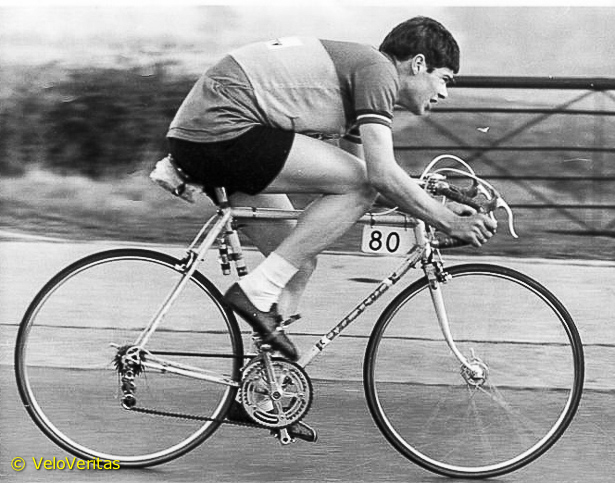
You were a Velo Sportiv man – tell us a Jocky Allan story, please.
“Jocky; the words he used frequently regarding me were: ‘Big’; ‘Stupit’; ‘Gett’; and ‘Useless’ – in no particular order.
“As road races were scarce in Scotland, Jocky would frequently load us up in the Van (Old Chug-a-Lug) and head south.
“Newcastle was a frequent destination, but we also hit some of the Star Trophy (Yes, THAT long ago) races further south.
“As Jocky had a bike shop to run, the journey would frequently start late Friday night, and continue through the night, with the riders sleeping in a mattress or two in the back.
“I remember Jocky waking me up once in the early hours of the morning somewhere in middle-England on the M6 and whispering; ‘The oil light’s come on.’
“I enquired; ‘When?’, and the answer was ‘Just after we left Edinburgh…’
“The dipstick was completely clean, not a trace of oil on it… amazingly, the van ran OK after we filled it up.
“Jocky was also responsible for my International debut, at the Isle of Man International Road Race in 1963, at the tender age of 18. I was on the Island for the Cycling Week, and had placed well in the “25”. Jocky came round to my hotel, and enquired when I was heading home. I told him, after the International.
“‘Good’ he said, ‘because you’re riding it for Scotland…’
“Bert Waugh had crashed during the week, and I joined Hughie (Shuggie) McGuire, Gordon McNaught and Norrie Drummond in the blue jerseys. Not an outstanding start, I clipped a wheel going up the Mountain on the first lap, and never saw them again.”
My friend Stuart Smith remembers you as always having cool cars back in the 60’s…
“I have been a lifelong friend and supporter of the British Used Car industry!
“My 60’s cars included a Ford Zephyr Convertible, Ford Capri, and a Jaguar 340 – the “Inspector Morse” version, not the most reliable of cars.
“My current mode of transport is a Porsche Boxster – I think only Roger St Pierre has had more cars than me.”
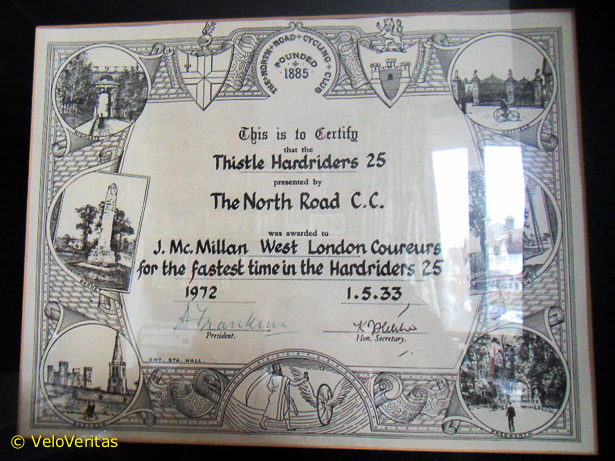
Tell us about your 1970 Commonwealth Games eventual non-selection hassles, please.
“The main problem was that I had moved to London in late ’67. I was doing really well on the track in London and Leicester, and was winning 10 mile races at 30 plus mph average.
“When I went to Edinburgh to take part in the training, I was having to take an overnight train then get to the track in the morning, or do the same by car.
“My performances were pretty rough, being conducted in a form of British Rail-lag.
“Also, Arthur Campbell (SCU supremo, ed.) and I didn’t get on well – Glasgow Communist used car dealer versus Edinburgh public school snotty kid…”
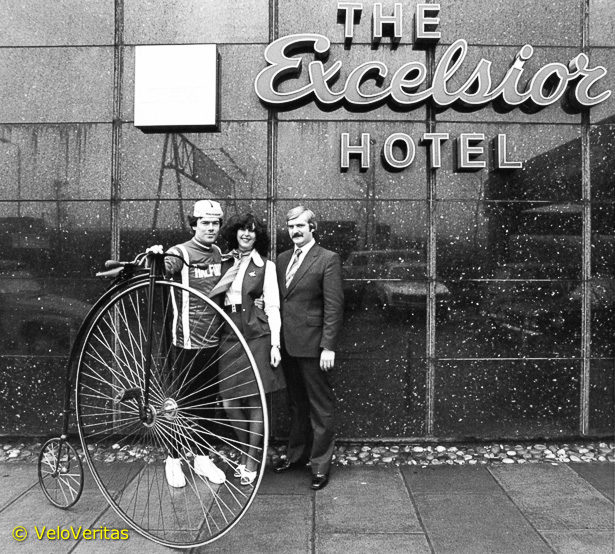
Four years a pro in the UK – what was the scene like?
“At once exhilarating, and other times depressing.
“Get up at 4.30am, collect like-minded other Pro’s – Nigel Dean, for example, then drive three hours up the M1/M6 for a two hour criterium in the rain, then drive home and take part in the 30 mile tailback back to London, having won a prime, if you were lucky.
“Most of the Pro’s were ex-National Champions, and I got an extra 2 mph from racing with them. They were also nice guys – off the bike. But then again, so was I?
“I had a bit of a short fuse; I lifted Brian Jolly off his bike during a race when we had a disagreement.
“Racing was never dull – even in the 275 miles London-Holyhead, there would be a mad dash to get in the early break. I remember Geoff Wiles and I sneaking off in the neutralised zone and getting 30 seconds up the road, before we looked at each other and said; ‘Do we really want to do this?'”
“We all had the habit of getting clipped-in and leaning on each other, at the start of crits. One race, we all pushed off, leaving the man in the middle, Rhys Bateman, motionless and strapped-in, to majestically crash to the ground.
“He was still there when we came round at the end of the first lap.
“And Sid Barras had one joke; he would put his jersey on and head for the door without shorts…”
You rode for Birds – what was the team like?
“Initially, it was a single-sponsor deal with Terry Cronin of Bird’s and Stan Rose of Alisian. We added Jack Kershaw and Tony Evans in 1976.
“The idea was that, if I didn’t succeed in getting away, I would lead them out for the sprint. The only problem was that when I went back to look for them, they were right at the rear of the bunch.
“Team organisation wasn’t brilliant, Stan was always late, so the last 10 miles to the HQ was pretty hectic – getting changed while the car was rocketing round bends was not easy. And, during the first London-Holyhead I rode, Stan did not make it to the second feed… words were exchanged.
“When we added Bill Horne and Rhys Bateman in 1977, Stan wanted a team photo literally five minutes before the start of race.
“People always wondered why we were all scowling at the camera…”
What was the Ron Kit set up like ?
“Pretty rubbish.
“I turned pro in August 1974, at the instigation of my friend Morgan (The Organ) Jackson.
“I only met Ron once, to sign the Contract. I collected my kit from his office manager, and just started racing and even got some places.
“Not a word from Ron.
“Then, at the end of the season he called Morgan and I and suggested we look for another couple of riders to make up a “proper” team for 1975.
“Then, silence, until a letter arrived in February 1975, informing me that I was no longer riding for Ron Kitching, and should return my bike forthwith.
“And I had turned down an approach from Holdsworth a week earlier!”
Why move to the States?
“It was a career move; I was a Sales Manager in the Telecoms Industry, and the opportunity came up to join a start-up in Los Angeles, which I had previously visited on a number of occasions – and loved the place!
“It was a great move, I had a super job, International Sales Manager, travelled frequently and made lots of $$$.
“Needless to say, I bought a Corvette…”
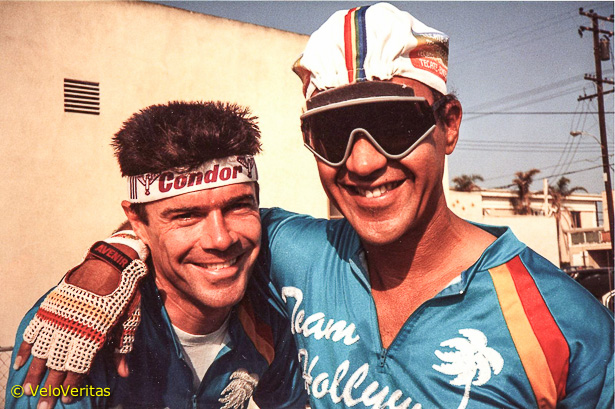
Did you race there and what was the scene like?
“I started racing after a year or so, when the job had settled down.
“As I had limited time for training, I concentrated on the track (Encino Velodrome) and criteriums; training with either the Griffith Park or Rosebowl chain gangs. I got pretty fit, and won a number of races, all by sneaking away at five laps to go, and holding them off.
“Amazingly, the field would let me go, until someone came along with an old copy of “Cycling”, with me on the front cover… next race, I made a move, and six guys were instantly on my wheel!
“Still, I made quite a few $$$ in some of the bigger crits, including one on Rodeo Drive in Beverly Hills, by deliberately going for Primes and ignoring the finish.
“I took a Prime off Andy Hampsten in one race…
“Racing in the US was not as sophisticated as Europe, the flag would go down, and it was like the Ben Hur Chariot Race. As long as I could stay upright, I would be in with a chance at the death.
“The crowds were pretty good, too.”
Why come back to Europe?
“Again, a career decision.
“I went into Partnership with a Swiss Businessman, and moved to Geneva….and continued racing!”
What are the biggest changes you observe between cycling in the 60’s and now?
“It would be the professionalism which exists within the sport; from the top down.
“Sky epitomises this, but other teams are catching up.
“Sky, by the way, still need a good brain driving the Team Car, their tactical knowledge is poor.
“But also, in the amateur ranks, even with the veterans, people prepare much better, watch their diet, adopt new training methods, and generally take racing much more seriously.
“And the equipment is in another world…”
Which amateur performance are you most proud of?
“It has to be the 1966 Scottish Milk Race, where I finished second, riding for the East of Scotland Team – which disintegrated after the second day – leaving me alone being attacked constantly by the Scottish Team with no love lost between Glasgow (them) and Edinburgh (me).
“A bit of nifty bargaining by Jocky (who else) resulted in my having the services of the North of England Team…”
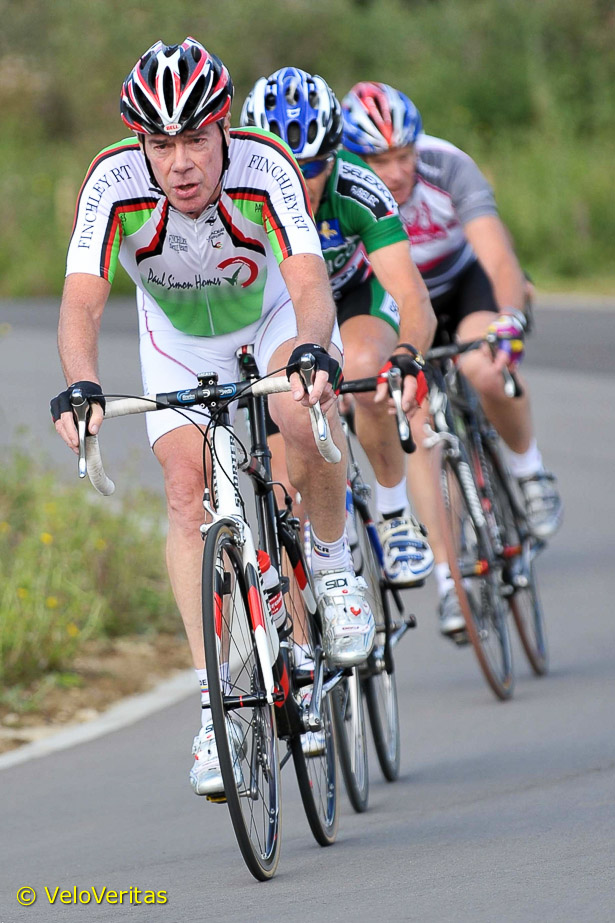
And among the pros?
“Not my one win, in 1975, (Morecambe-Hull) but the points prize and seventh overall in the Circuit du Port de Dunkerque in 1976.
“I was in a long two-up break with Willy de Geest [then riding for Brooklyn, ed.], was caught then bridged across to the next break in the last 10 km – needless to say I was not well up in the Sprint, but had done enough for the points.
“The “Voix du Nord” wrote that I was built like a Breton Manor House, and had a style like a coal miner…. Humph!”
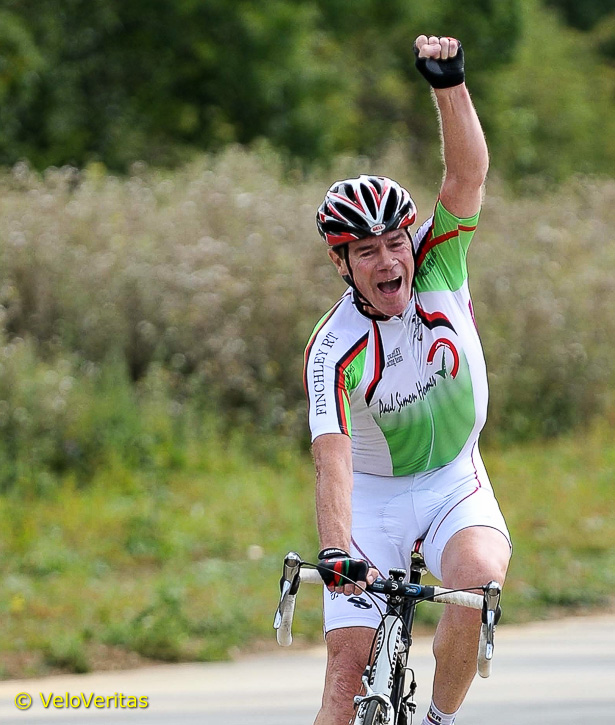
Looking back, what would you do differently?
“Difficult one, that.
“I’ve had a good cycling career, but also a good business one, too.
“Sometimes think I should have tried my luck in France when I was 21, but then I had a University Degree to finish, and pressure from my family to continue my studies and start a career.
“My business career has taken me to live and work in the USA, Switzerland and France, and I’ve thus had to opportunity to race there, as well.
“Maybe the only cycling thing I should have done better was work on my pursuiting; I knew I had potential there, but never trained properly for it.”
It all seemed so much more like fun back then – with thanks to John for his recollections.



